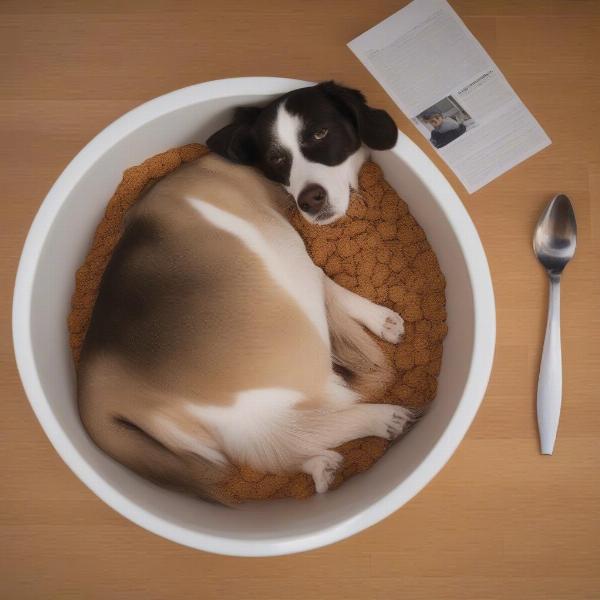Elevated neutrophils in dogs, also known as neutrophilia, indicate an increase in these vital white blood cells. Neutrophils are the first line of defense against bacterial infections, but their elevation can also be triggered by other factors. Understanding what causes high neutrophil counts and what it means for your furry friend is crucial for prompt diagnosis and treatment.
Decoding the Dog Blood Test: What are Neutrophils?
Neutrophils are a type of white blood cell produced in the bone marrow. They are essential components of the immune system, acting as the body’s primary defense against bacterial and fungal infections. When an infection occurs, the body produces more neutrophils to combat it, resulting in an elevated neutrophil count. This response is often referred to as neutrophilia.
Causes of Elevated Neutrophils in Dogs: Beyond Infection
While infection is a common cause of neutrophilia, several other factors can contribute to an elevated neutrophil count. These include:
- Inflammation: Conditions like pancreatitis, arthritis, and inflammatory bowel disease can trigger an increase in neutrophils.
- Stress: Physical or emotional stress can lead to a temporary rise in neutrophil levels. This is sometimes referred to as “stress leukogram.”
- Certain Medications: Steroids, like prednisone, can cause a significant increase in neutrophils.
- Trauma or Injury: The body’s natural response to injury involves an influx of neutrophils to the affected area.
- Cushing’s Disease: This hormonal disorder can also lead to elevated neutrophil counts.
- Cancer: Certain types of cancer, particularly those affecting the bone marrow, can cause increased neutrophil production.
“Understanding the underlying cause of elevated neutrophils is crucial. A comprehensive veterinary examination is necessary to accurately diagnose the issue and determine the best course of treatment,” says Dr. Emily Carter, DVM, a veterinary specialist in internal medicine.
Symptoms Associated with High Neutrophils in Dogs
The symptoms associated with elevated neutrophils in dogs vary depending on the underlying cause. If the neutrophilia is due to infection, you might observe symptoms like fever, lethargy, loss of appetite, vomiting, or diarrhea. In cases of inflammation, there might be pain, swelling, redness, or difficulty moving.
 Dog Displaying Lethargy and Loss of Appetite
Dog Displaying Lethargy and Loss of Appetite
If the elevated neutrophils are caused by stress, the symptoms might be more subtle, such as changes in behavior, increased panting, or excessive grooming. It’s essential to observe your dog closely for any unusual changes and consult your veterinarian.
Diagnosing and Treating Neutrophilia in Dogs
Diagnosing the cause of elevated neutrophils typically involves a complete blood count (CBC), along with a physical examination and review of your dog’s medical history. Further tests, such as urinalysis, X-rays, or ultrasounds, may be necessary to pinpoint the underlying issue. high neutrophils in dogs
Treatment for elevated neutrophils depends entirely on the underlying cause. If an infection is present, antibiotics will likely be prescribed. For inflammatory conditions, anti-inflammatory medications or steroid responsive meningitis in dogs may be necessary. Managing stress, addressing underlying hormonal imbalances, or treating cancer might be required in other cases.
“Treating the underlying cause is the key to managing neutrophilia effectively. Regular monitoring through blood tests is often recommended to track the neutrophil levels and ensure the effectiveness of the treatment,” adds Dr. David Miller, DVM, a board-certified veterinary internist.
Conclusion: Addressing Elevated Neutrophils Proactively
Elevated neutrophils in dogs are a sign that something is amiss. While not a disease in itself, neutrophilia indicates an underlying health issue that requires attention. Prompt diagnosis and appropriate treatment are crucial for ensuring your dog’s well-being. Don’t hesitate to contact your veterinarian if you notice any changes in your dog’s health or behavior.
FAQ:
- What is the normal neutrophil range in dogs? A normal neutrophil count in dogs typically ranges from 3,000 to 11,500 neutrophils per microliter of blood.
- Can stress alone cause elevated neutrophils in dogs? Yes, stress can cause a transient increase in neutrophils, often referred to as a stress leukogram.
- Are elevated neutrophils always a sign of infection? No, while infection is a common cause, inflammation, stress, certain medications, trauma, and other conditions can also lead to elevated neutrophils.
- What should I do if my dog has elevated neutrophils? Consult your veterinarian immediately for proper diagnosis and treatment.
- How are elevated neutrophils treated? Treatment depends entirely on the underlying cause and can range from antibiotics for infections to managing stress or treating underlying diseases like Cushing’s disease or cancer.
- Can elevated neutrophils be a sign of something serious? Yes, elevated neutrophils can indicate serious conditions like cancer or severe infections. Therefore, prompt veterinary attention is crucial.
- How can I help prevent elevated neutrophils in my dog? Maintaining a healthy lifestyle for your dog, including a balanced diet, regular exercise, and minimizing stress, can support a healthy immune system. Regular veterinary check-ups are also essential for early detection of any potential issues.
ILM Dog is your trusted international resource for all things dog-related. We offer expert advice on dog breeds, health, training, nutrition, grooming, and much more. From puppy care to senior dog care, we cover every aspect of dog ownership to help you provide the best possible care for your canine companion. monocytosis in dogs For any inquiries, contact us at [email protected] or +44 20-3965-8624. ILM Dog is committed to providing valuable insights and resources to help you navigate the joys and responsibilities of dog ownership.